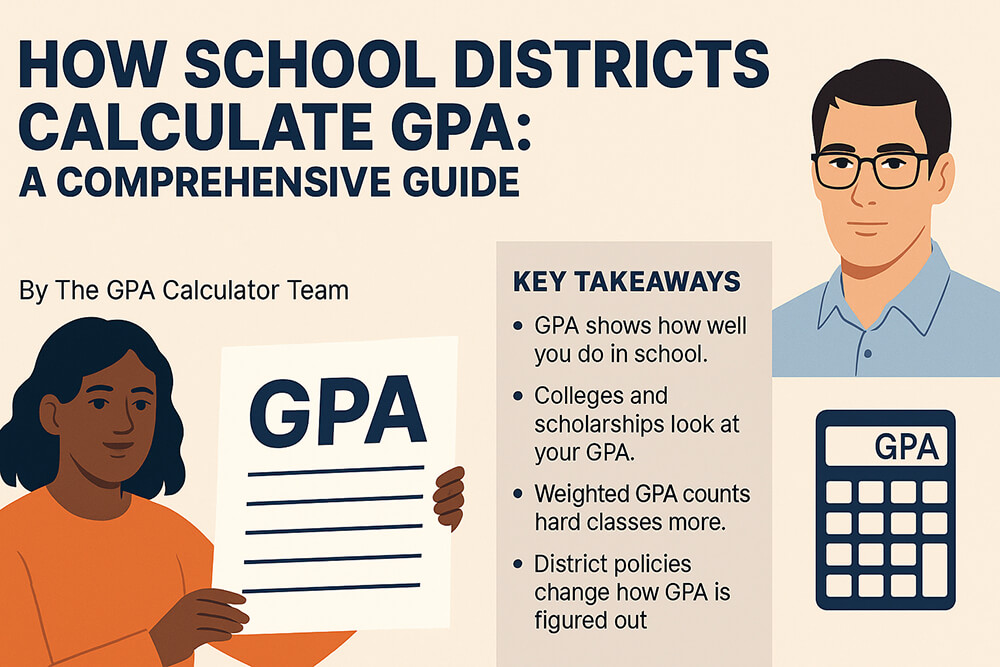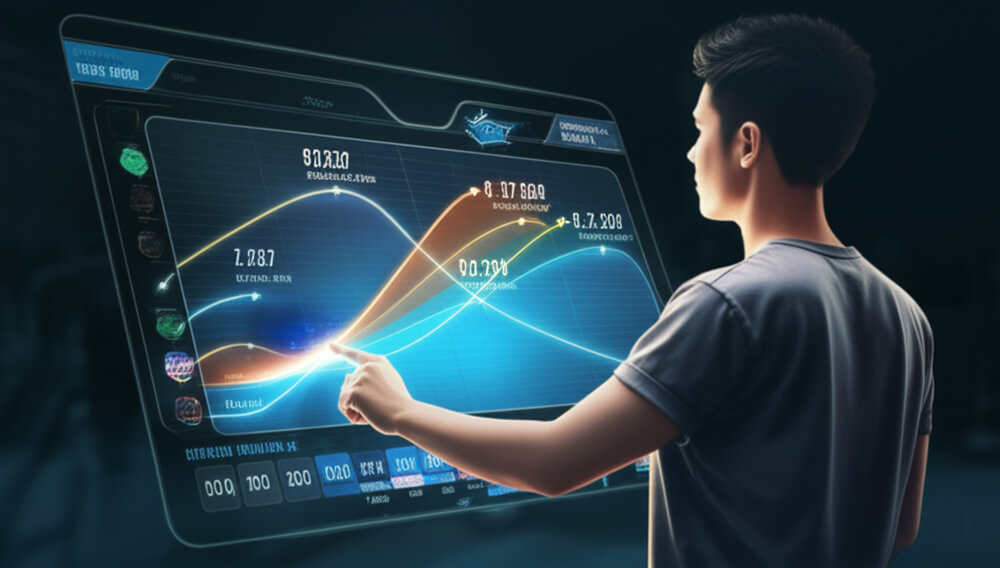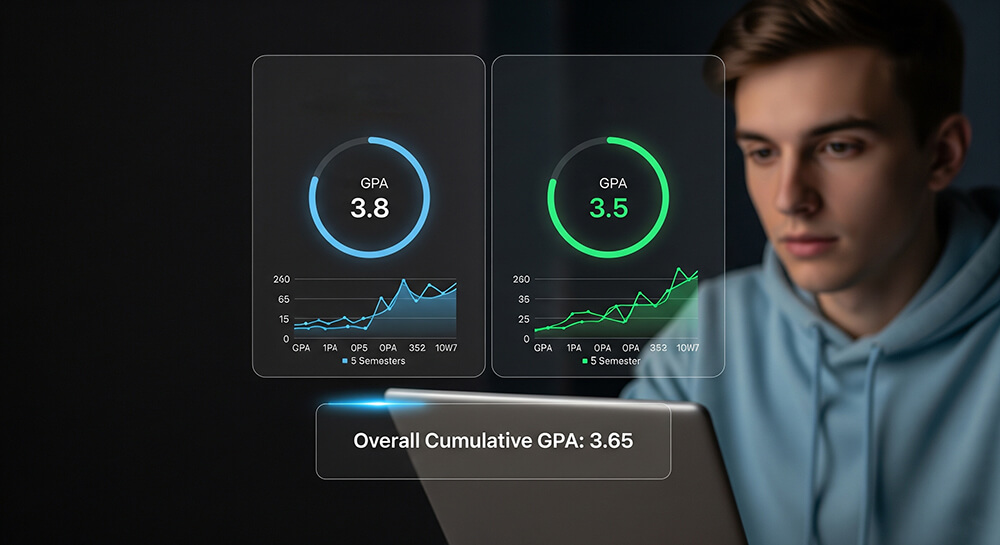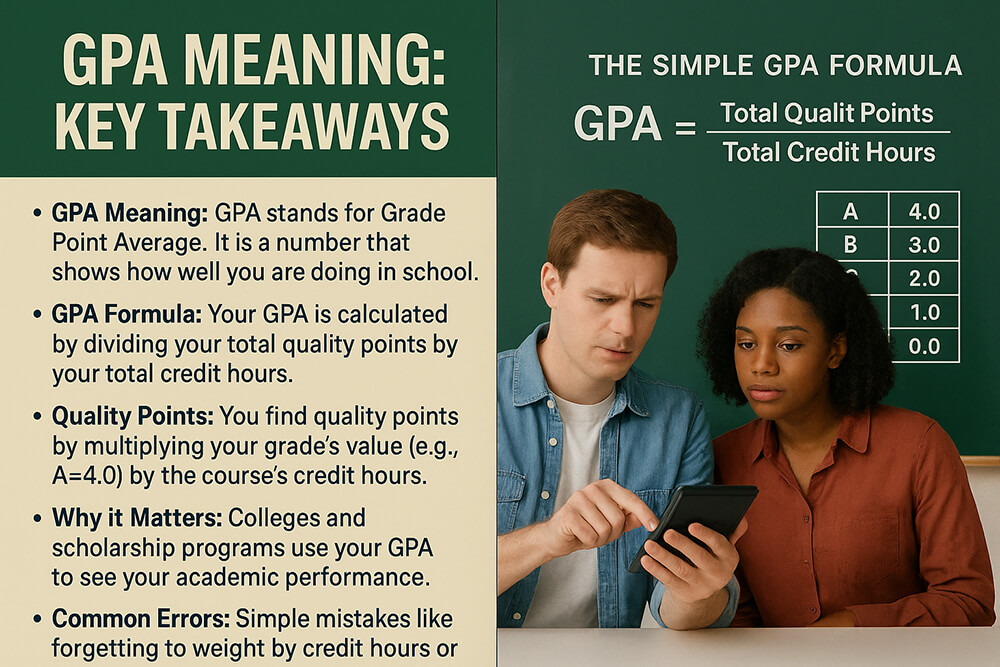Key Takeaways
| Feature | Benefit |
|---|---|
| Honors Forecasting | Predicts if you will earn cum laude, magna cum laude, or summa cum laude. |
| Personalized Goals | Shows the exact GPA you need in your remaining classes to reach each honors level. |
| Scenario Planning | Lets you see how different future grades will impact your honors eligibility. |
| Reduces Uncertainty | Clears up confusing school policies on GPA cutoffs and class rank. |
| Motivates Success | A clear visual of your goal helps you stay focused and work harder. |
What Is a Graduation Honors Predictor?
A Graduation Honors Predictor is a tool that helps you see if you can graduate with honors. It looks at your current grades and your school's rules. Then, it tells you what GPA you need to achieve honors like cum laude, magna cum laude, or summa cum laude. This tool takes the guesswork out of academic planning. It gives you a clear target to aim for. The main goal of The GPA Calculator is to provide tools that help you succeed in school.
Know Your School's Honors Rules
Every school has different rules for graduation honors. Some use a fixed GPA number. Others give honors to a certain top percentage of the class. A Graduation Honors Predictor knows these rules. It understands how school districts calculate gpa and college policies. The tool also knows about different scales, like the 5.0 gpa scale guide. This helps you understand the specific requirements you need to meet at your school.
Find Your Current GPA
Before you can predict the future, you need to know where you stand now. The first step is to calculate your current cumulative GPA. You can use a college GPA calculator to do this. The tool lets you input all your past grades and credits. You can also use a semester GPA calculator to see your performance in the current term. This starting point is the foundation for predicting your final honors status.
See What Grades You Need
Once you have your current GPA, the predictor shows you the path to honors. It calculates the exact grades you need in your future classes. A mid-term grade projection slider lets you experiment with different scenarios. For younger students, a freshman year gpa predictor can set a long-term goal. This feature turns a big goal like "summa cum laude" into small, manageable steps. You know exactly what you need to do each semester.
Understand How Grades Are Weighed
Not all classes affect your GPA the same way. The Graduation Honors Predictor understands this. It knows the difference between weighted vs unweighted gpa. The tool uses a gpa weighting guide honors ap to give extra points for more difficult classes. This is important because a high weighted GPA is often required for top honors. The predictor helps clear up confusion by showing how these special classes boost your standing.
Plan for Special Grade Situations
Sometimes your academic record has unique situations. The predictor can handle these. If you retake a class, the repeat course gpa recalculator shows how a new grade will help. The tool also offers a drop lowest grade analyzer for classes with grade forgiveness. For any pending grades, the gpa planning for incomplete grades feature helps you plan. This ensures your honors prediction is always accurate.
Manage Complicated Transcripts
Students with complex academic histories can also use the predictor. The transfer credits gpa integrator helps combine grades from different schools. If you are in two programs, the dual degree gpa splitter keeps your GPAs separate but accurate. For students who have studied internationally, the study abroad grades gpa integrator correctly converts those grades. The tool handles all this data to give you one clear prediction.
Set and Track Your Honors Goals
A Graduation Honors Predictor is a great motivational tool. You can set a specific goal, like making the Dean's List. The deans list eligibility checker can tell you exactly what you need for that. Some honors are based on your most recent work, which the last 60 credits gpa calculator can track. Seeing your progress toward these goals keeps you focused and encourages you to do your best work.
Visualize Your Path to Honors
Seeing your progress can make a big difference. A gpa trend graph generator creates a picture of your academic journey. It shows your GPA rising over time as you work toward your honors goal. Before you start, you can do a transcript gpa audit guide to make sure all your grades are correct. This visual path makes your goal feel more attainable and celebrates your hard work along the way.
Understand Core GPA Concepts
To use the predictor well, it helps to know the basics. The tool uses a simple gpa formula guide for all its calculations. It is also helpful to know the difference between quality points vs gpa explained. The predictor even has a letter to point gpa conversion guide to show how it turns your grades into numbers. Understanding these ideas helps you trust the tool and take control of your academic future.
Frequently Asked Questions (FAQ)
What is a Graduation Honors Predictor? It is a tool that uses your current grades and your school's rules to forecast your chances of graduating with honors like cum laude, magna cum laude, or summa cum laude.
How does the predictor know my school's honors rules? These tools have a database of policies from many universities. They know the specific GPA cutoffs or class percentile requirements for each school.
Can it tell me what grades I need to get? Yes, a key feature is showing you the GPA you must earn in your remaining courses to reach the different honors thresholds.
Does the predictor work with weighted GPAs? Yes, it is designed to handle both weighted and unweighted GPAs, so your advanced or honors coursework is counted correctly toward your honors eligibility.
What if my school's honors requirements change? A good Graduation Honors Predictor updates its database regularly to reflect the latest honors criteria published by universities each year.










